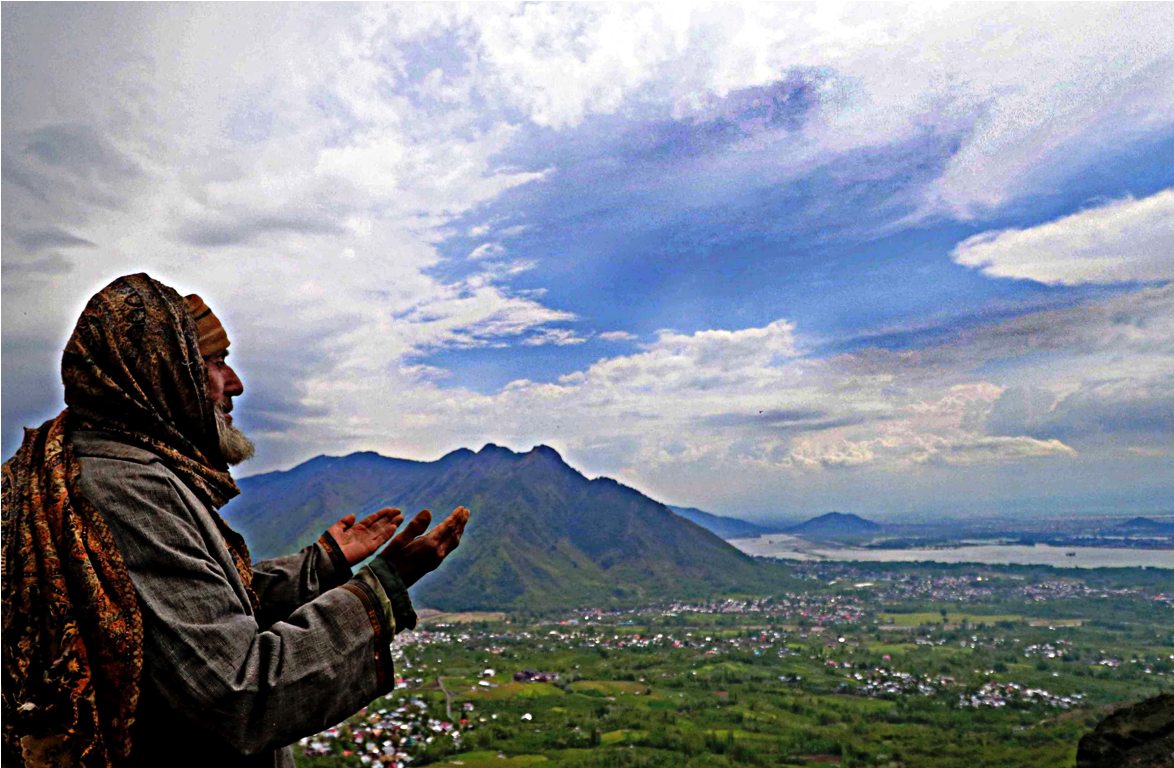by Mudasir Rehman
There is an intricate psychology behind the human tendency to assign responsibility to God for omens and misfortunes, while concurrently neglecting the tangible, human-induced causes.
Across human history, a consistent theme emerges: in the face of challenges, humans often turn to the divine for understanding. Whether grappling with droughts, natural disasters, or other adversities, there is a proclivity to attribute these occurrences to God or supernatural forces. Yet, the genuine roots of many of these issues often reside much closer to home. In this examination, we will explore the intricate psychology behind the human tendency to assign responsibility to God for omens and misfortunes, while concurrently neglecting the tangible, human-induced causes.
Inherent in human nature is a pursuit of meaning in our experiences. When confronted with seemingly arbitrary or calamitous events, the human inclination is to seek comprehension. This innate drive has fostered the creation of intricate belief systems and myths that imbue the forces of nature with intention and purpose. Cultures worldwide, throughout history, have attributed natural phenomena to the actions of gods, spirits, or divine entities. This inclination to discern meaning and causation influences our interpretation of events. When adversity befalls us, there is an instinctive quest to identify someone or something culpable. Frequently, this search for meaning directs our focus toward a higher power, such as God.
The Role of Religion
Religion profoundly influences our perception of the world and our position within it. A central tenet in numerous religious traditions is the concept of divine providence, asserting that God actively intervenes in worldly affairs, including natural phenomena. When societies embrace such beliefs, it becomes ingrained to attribute both favourable and unfavourable events to a divine origin. During crises, religious communities often resort to prayer and supplication to alleviate suffering. While providing solace and optimism, this practice can reinforce the notion that God is the arbiter of all outcomes, whether positive or negative.

This inclination to attribute natural disasters and environmental issues to divine will rather than scrutinising human-caused factors is a noteworthy facet of this phenomenon. A compelling aspect is the human proclivity to disavow responsibility for creating conditions leading to adverse events. In the face of consequences arising from environmental degradation, for instance, it is often more convenient to ascribe blame to God or fate than to confront our actions. This reluctance to acknowledge culpability enables the evasion of guilt and impedes meaningful action toward addressing the root causes of problems. A glaring illustration of this behaviour is evident in the delicate and interconnected nature of Earth’s ecosystems.
Ecological Issues
Human activities, such as deforestation, pollution, and over-exploitation of natural resources, can inflict severe consequences. Droughts, extreme weather events, and other environmental disasters are commonly attributed to divine wrath or viewed as harbingers of impending doom. Contrary to such perceptions, the well-documented causes of these environmental challenges trace back to human activities.
For instance, deforestation disrupts ecosystem equilibrium, contributing to climate change and erratic weather patterns. Industrial pollution and the combustion of fossil fuels exacerbate these issues, resulting in air and water pollution detrimental to both human health and the environment. Recognising and addressing these human-induced factors is crucial for fostering a more accurate understanding of environmental challenges and, consequently, implementing effective solutions.
The Psychological Mechanism
To comprehend why humans often attribute omens and misfortune to God while dismissing human-induced causes, an exploration of the underlying psychological mechanisms is imperative. Key contributors to this behaviour include:
Cognitive Dissonance: The concept of cognitive dissonance plays a pivotal role in attributing misfortune to God. When confronted with a complex situation or the consequences of our actions, discomfort arises from an inability to discern the true cause. To mitigate this discomfort, individuals often employ cognitive shortcuts, such as assigning the problem to a higher power. This absolves them of personal responsibility, alleviating anxiety and frustration.
Comfort in Externalisation: Blaming God or supernatural forces offers a sense of comfort by implying that these forces control the situation. Externalising responsibility can relieve individuals and societies from the onus of implementing challenging behavioural changes. In the context of personal health, some may attribute illnesses or health issues to supernatural forces or karma instead of scrutinising lifestyle choices.
For instance, an individual with a smoking-related illness may attribute it to “God’s Will” rather than acknowledging their role in the illness due to smoking. This externalisation impedes individuals from taking responsibility and making positive behavioural changes.
On a broader scale, societies exhibit a parallel tendency. For example, a society grappling with widespread poverty and inequality may externalise responsibility by attributing these issues to fate or a divine plan. This discourages critical self-reflection and the imperative for systemic changes, fostering a collective resignation where individuals perceive limited agency in addressing challenges assumed to be beyond human control. However, this transient comfort perpetuates worsening situations until individuals acknowledge their role and take responsibility for their actions.
Navigating the Impact: Grappling with the tangible repercussions of our environmental impact and the associated responsibility can be formidable, often triggering feelings of fear and guilt. As a coping mechanism, attributing blame to God emerges as a recourse, providing an abstraction that allows individuals to distance themselves from these complex emotions. However, this coping strategy carries inherent risks, fostering detrimental outcomes for society, accountability, and the natural world.
Consider a community accountable for polluting a nearby river through industrial or agricultural waste disposal. Confronting the environmental aftermath may instigate fear and guilt among its members. Some may opt to attribute the pollution to divine will or fate, weaving it into a broader cosmic plan. This inclination distances them from the responsibility of remedying the pollution problem. Such a mindset poses an impediment to proactive measures, hindering endeavours to cleanse the river or enforce stricter regulations on industrial and agricultural practices. Persistent adherence to existing practices perpetuates the challenges we face.

It is imperative to engage in introspection and take ownership of our actions. God does not derive pleasure from the destruction of nature and humanity, and perpetuating this belief is both misguided and counterproductive. A collective revaluation and proactive approach are essential to address the environmental issues we confront.
Cultural and Social Dynamics: Our beliefs and behaviours are profoundly influenced by cultural and social norms. In societies where natural events are predominantly attributed to divine forces, individuals tend to align with this perspective. Cultural and social norms, known for their resistance to change, persist even when emerging evidence or scientific knowledge contradicts prevailing beliefs. This steadfast resistance often results in the ongoing attribution of natural events to divine forces, despite the availability of alternative explanations rooted in scientific understanding. This resistance assumes a semblance of indoctrination, impeding the advancement of knowledge and critical thinking.
Conclusion
The inclination to attribute omens and adverse events to God, while sidelining human-induced causes, is a nuanced interplay of psychology, culture, and religion. While finding meaning and solace in the divine is inherent to human nature, it should not serve as a justification to evade accountability for our actions and their repercussions. Confronting environmental challenges, social injustices, and other urgent issues requires acknowledging our role in shaping the world and assuming responsibility for fostering a more sustainable and equitable future. Only through this acknowledgement can we genuinely address the impact of omens and adverse events afflicting our world.

This reflection emerged during an examination of my society and environment. In the face of an arduous climate, people impatiently await rain, often attributing the harsh weather to divine will. However, it prompts a pause to consider whether we have reflected on our decisions, such as the indiscriminate felling of decades-old trees crucial for maintaining ecological balance. It is essential to refrain from assigning blame to God for adversities, recognising that we possess the intellectual capacity, bestowed upon us in the creation of the universe, to sustainably manage and balance resources. Calm lives ensue only when we embrace responsibility for our actions.
(The author, a research scholar, can be contacted at [email protected]. Ideas are personal)















